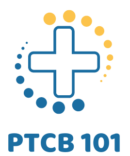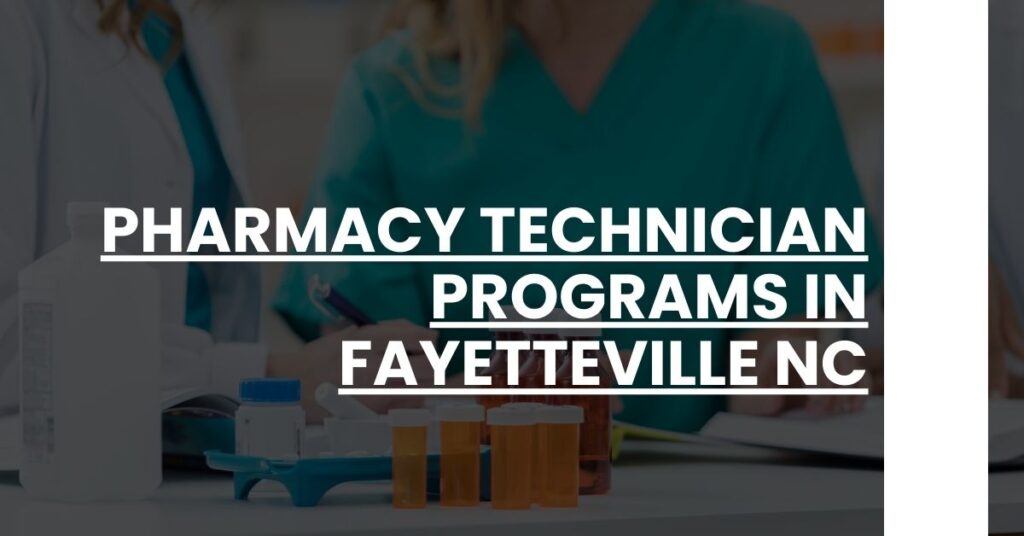Not in Fayetteville? Check out our lists of Pharmacy Technician Programs in Cary, Charlotte, Concord, Durham, Greensboro, High Point, Raleigh, Wilmington, Winston-Salem, and across North Carolina.
Interested in a rewarding career as a pharmacy technician in Fayetteville, NC?
We’ve researched the top pharmacy technician programs in Fayetteville, NC, to help you find the right fit.
This guide covers the best options, what you’ll learn, and how each program can set you up for success.
Fayetteville Technical Community College – Pharmacy Technology Program
The Pharmacy Technology Program at Fayetteville Technical Community College (FTCC) is structured to equip students with the skills needed to become efficient Pharmacy Technicians. This program aims to provide quality instruction and practical experience, essential for graduates to pass the national certification exam and become Certified Pharmacy Technicians (CPhT).
Accreditation and Curriculum
Accreditation: The program is accredited by the Pharmacy Technician Accreditation Commission (ASHP/ACPE). This ensures it meets high-quality educational standards.
Program Duration: Spanning over four semesters, the curriculum leads to an Associate Degree in Pharmacy Technology.
Coursework and Prerequisites
Core Topics:
- Pharmacy law and ethics: Understanding legal and ethical standards.
- Medical terminology: Learning the language used in the healthcare setting.
- Pharmaceutical calculations: Mastering mathematical skills essential for medication dispensing.
- Inventory management: Keeping track of medicines and supplies in various settings.
Prerequisites: Applicants must meet specific requirements and earn competitive points during the application process.
Fees and Financial Aid
Tuition Fees: These are determined by the State Board of Community Colleges and the North Carolina General Assembly. Changes may apply.
Career Opportunities
Upon completing the program, graduates can work in diverse settings such as:
- Retail pharmacies
- Hospitals and clinics
- Nursing homes
- Research laboratories
Passing the National Pharmacy Technician Certification Exam is essential for employment in North Carolina, and graduates must register with the North Carolina Board of Pharmacy.
Fayetteville Technical Community College – Pharmacy Technician Certification Course
The Pharmacy Technician Certification Course at Fayetteville Technical Community College is designed to bestow fundamental knowledge and skills for success in pharmacy roles.
Curriculum and Key Features
Course Structure:
- Medical terminology and anatomy: Comprehensive understanding of the body and medicine-related terms.
- Pharmaceutical laws and ethics: Federal and state regulations concerning pharmacy operations.
- Insurance plans: Detailed study of various patient insurance plans.
- Practical Skills: Differences in institutional and retail pharmacy operations.
Scholarships: Scholarships potentially cover tuition and course fees, aiding financial aspects.
Requirements and Resources
Requirements:
- Personal Computer and Internet: Necessary for online coursework.
- Textbook: “The Pharmacy Technician (Seventh Edition)” by Morton Publishing Company.
Certification Exam: Upon completion, students are prepared to take the Pharmacy Technician Certification Exam (PTCE).
Employment Prospects
Certification and Recognition: Certified graduates can work in North Carolina and many other states, widening job possibilities across various pharmacy settings. Consistent internet access and personal computers are required for coursework.
North Carolina Central University – Continuing Education Pharmacy Technician Course
The Continuing Education Pharmacy Technician Course at North Carolina Central University offers a flexible, online approach to pharmacy technician education. This program aims to prepare students for the Pharmacy Technician Certification Board (PTCB) National Certification Exam.
Curriculum and Accessibility
Core Topics:
- Pharmacy law and ethics: Study of legal and ethical standards in pharmacy.
- Pharmaceutical calculations and pharmacology: Mastery of essential calculations and drug knowledge.
- Externships: Opportunities for practical experience with leading pharmacy chains.
Accessibility: No prior prerequisites are required. The course is approachable for all aspiring pharmacy technicians.
Program Duration and Career Growth
Completion Time: The course can be finished within a year or less, excluding externship programs or state licensure exams.
Career Prospects: The Bureau of Labor Statistics (BLS) predicts a 12% growth in pharmacy technician jobs by 2028. This growth equates to over 30,000 new job opportunities with an average annual salary of $32,700.
Instructors and Quality
Experienced Instructors: Industry experts Melissa Dunworth and Betty Stahl ensure top-quality instruction.
Summary
Each of these programs offers unique benefits and is structured to prepare you for a successful career as a pharmacy technician. Whether you prefer in-person or online learning, there is a program that aligns with your needs and career goals. The certifications attained through these programs ensure a promising career in various pharmacy settings, setting you up for a bright future in healthcare.
Miller-Motte College – Pharmacy Technician Program
Miller-Motte College in Fayetteville, NC offers a robust Pharmacy Technician Program designed to arm you with the essential skills and knowledge for a fruitful career in the pharmaceutical field. The program’s emphasis is on preparing you for entry-level positions as a pharmacy technician, under the guidance of licensed pharmacists.
Core Curriculum
Program Focus:
- Pharmacy calculations: Learn to accurately measure and dispense medications.
- Medication dosage forms and routes of administration: Understand the various ways medications are administered.
- Drug interactions and side effects: Gain insight into how different drugs can interact and their potential side effects.
- Medical terminology: Master the language of healthcare.
- Pharmacy laws and ethics: Navigate the legal and ethical frameworks governing pharmacy practice.
- Inventory management: Develop practical skills in managing pharmacy inventories.
Hands-On Training
This program integrates classroom instruction with hands-on training through laboratory exercises and externship opportunities. By the end of the program, you will have the experience needed to assist pharmacists with tasks such as:
- Dispensing medication
- Compounding medication
- Maintaining patient profiles
- Delivering excellent customer service
Career Services
Miller-Motte College provides ongoing career services to support graduates in exploring job opportunities that match their individual interests. However, it’s important to note that while the college strives to prepare you for success, it does not guarantee employment or a specific salary.
For more detailed information on program costs, duration, and specific career services, you can contact Miller-Motte College directly.
What to Consider When Choosing a Pharmacy Technician Program
When selecting a Pharmacy Technician Program, it’s crucial to consider several key factors to ensure you make a well-informed decision. Here’s a guide to help you evaluate your options.
Accreditation
- Verify Accreditation: Ensure the program is accredited by reputable organizations like the Pharmacy Technician Accreditation Commission (ASHP/ACPE). This guarantees that the program meets high standards of quality, which can influence certification and employment opportunities.
Curriculum
- Investigate Curriculum: Look into the curriculum to confirm that it covers essential topics such as:
A well-rounded curriculum better prepares you for certification exams and real-world roles.
Hands-On Training
- Hands-On Training: Seek programs that offer practical, hands-on training through lab exercises and externship opportunities. Experiential learning is critical for gaining real-world skills and confidence.
Program Duration
- Consider Program Length: Evaluate the duration of the program. Some programs offer accelerated options that can be completed in less time, which might be beneficial if you wish to join the workforce sooner.
Costs and Financial Aid
- Evaluate Costs: Consider the total cost of tuition, fees, textbooks, and other associated expenses. Check if financial aid, scholarships, or payment plans are available to help offset costs.
Job Placement Rates
- Job Placement Services: Research the program’s job placement rates and the support services offered to aid employment. Programs with high job placement rates and strong career services can significantly boost your chances of securing a job post-graduation.
Summary
When you weigh these factors carefully, you’ll be in a better position to choose a program that aligns with your career goals and provides the foundation you need for a successful future in pharmacy tech.
Conclusion
Choosing the right pharmacy technician program is a crucial step in launching your career in healthcare. Fayetteville, NC, offers a variety of educational options designed to equip you with the skills and knowledge necessary to succeed in this in-demand field. Whether you’re looking at the comprehensive curriculum at Fayetteville Technical Community College, the flexible online training at North Carolina Central University, or the hands-on experience provided by Miller-Motte College, there is a program tailored to meet your needs. Take the next step toward your career goals by choosing a program that best fits your educational and professional aspirations.

